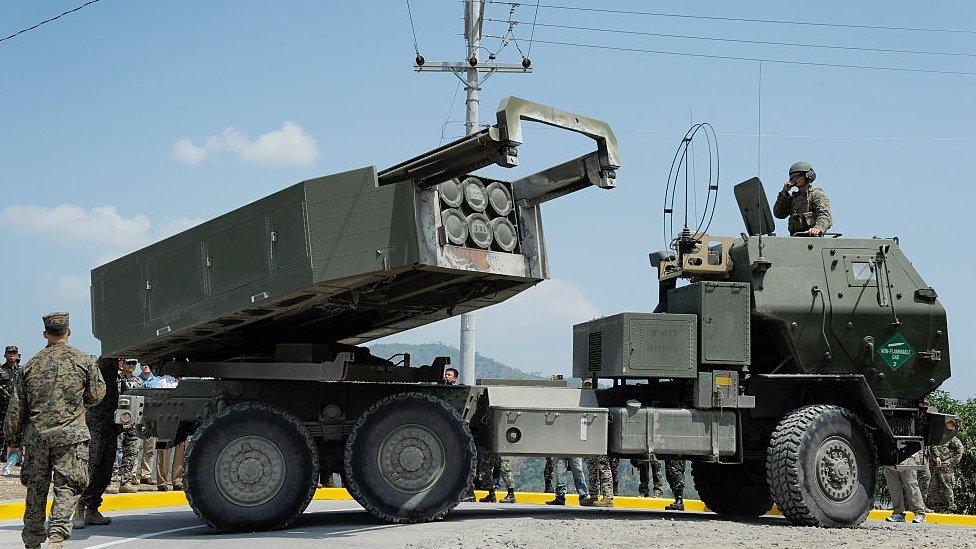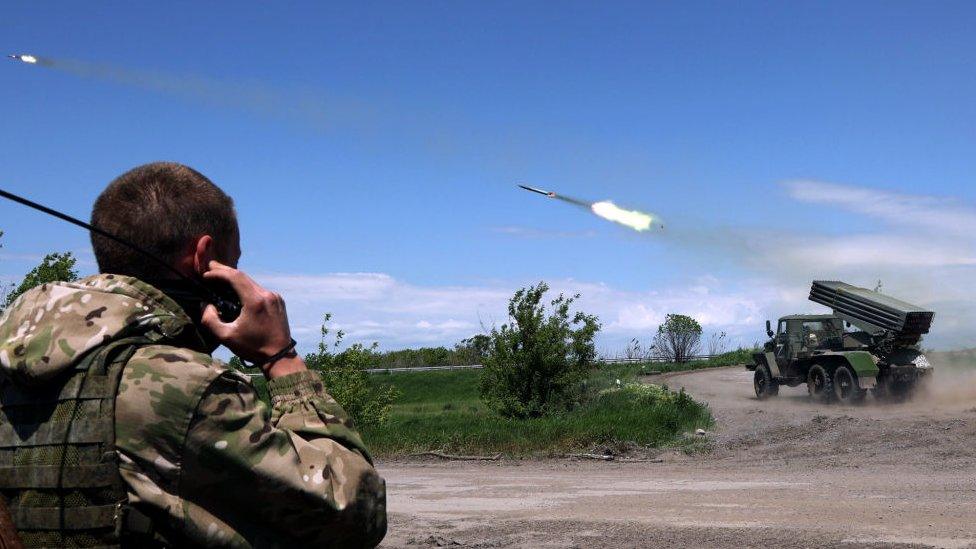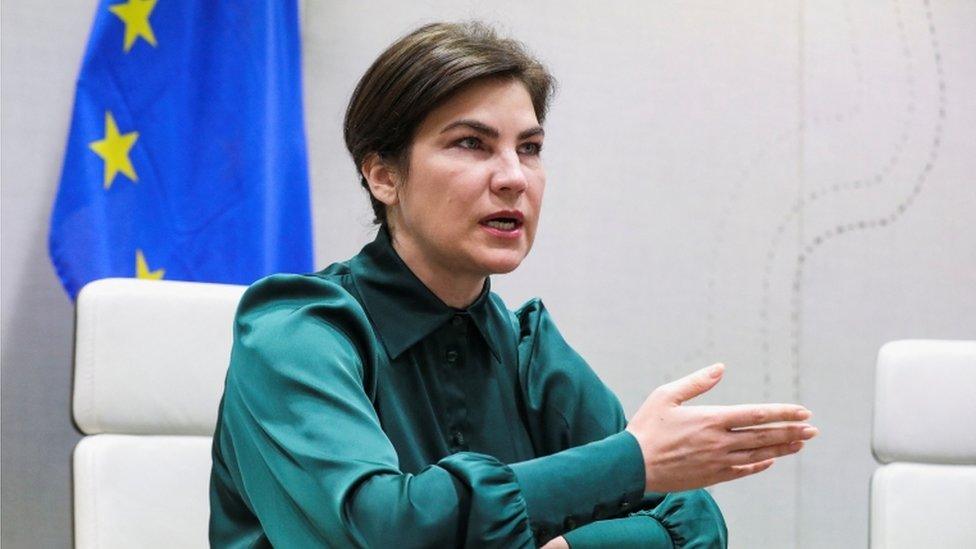Ukraine war: Russia says US 'adding fuel to fire' by sending longer-range rockets
- Published

A White House official said the weapons would include medium-range High Mobility Artillery Rocket System (HIMARS)
Russia has accused the US of seeking to prolong the war in Ukraine after President Biden said he would supply Kyiv with new long-range missiles.
Kremlin spokesman Dmitry Peskov said the US was "intentionally adding fuel to the fire" with the deliveries.
"Such supplies do not contribute to the Ukrainian leadership's willingness to resume peace negotiations," he added.
Separately, the German government has promised to send an air defence system to Ukraine.
Chancellor Olaf Scholz told MPs that the IRIS-T system was the most modern Germany possessed and would enable Ukraine to defend an entire city against Russian air attacks.
Russian Foreign Minister Sergei Lavrov hit out against the deliveries and said Mr Biden's announcement increased the risk of a "third country" being dragged into the conflict.
The long-range missiles are to help Ukrainian troops strike enemy forces more precisely from a longer distance.
The US had previously been unwilling to provide the weapons out of fear they could be used against targets in Russia, but the US says Kyiv has given assurances that this will not happen.
On Wednesday, Mr Biden said the lethal aid would strengthen Kyiv's negotiating position against Russia and make a diplomatic solution more likely.
A senior US official said the new weapons package would include four M142 High Mobility Artillery Rocket Systems (HIMARS).
"These are precision guided systems with extended range. And so for high value targets that that allow them to keep some of the pressure off of Ukrainian forces on the front, we think these systems will be very useful," Undersecretary for Defense Dr Colin H Kahl said.
The systems can launch multiple precision-guided missiles at targets as far as 70km (45 miles) away - far further than the artillery that Ukraine currently has. They are also believed to be more accurate than their Russian equivalents.

Game changer for Donbas?

This announcement has been a long time coming and represents one of the most significant military commitments so far.
As they face overwhelming Russian firepower in a grinding, attritional battle for the Donbas, Ukrainian forces complain that they lack firepower.
The HIMARS could change that.
Its GPS-guided rockets are much more accurate than the equivalent Russian systems. It's also much quicker to reload and, as the name suggests, the launch vehicles can move quickly from one location to another.
US and Ukrainian officials will already be having detailed conversations about how and where to use the HIMARS when they arrive.
Ukraine will be looking to hit targets well beyond its current reach - command and control centres, logistics hubs, and the Russian batteries that have Ukrainian troops pinned down in Donbas.

White House officials agreed to provide the rockets, they said, only after gaining assurances from President Volodomyr Zelensky that the weapons would not be used to attack targets inside Russia.
"We are not going to send to Ukraine rocket systems that can strike into Russia," Mr Biden wrote on Wednesday.
Mr Zelensky confirmed this in an interview for US network Newsmax, external.
"We're not interested in what is happening in Russia," he said. "We're only interested in our own territory in Ukraine."
But Mr Peskov said Moscow did not trust Mr Zelensky's remarks.
"In order to have trust, we need to have experience of Kyiv fulfilling its promises, but there is none," he said, quoted by Ria news agency.
Addressing the US announcement, he said: "We believe the US is directly and intentionally adding fuel to the fire... The US is obviously holding the line that it will fight Russia to the last Ukrainian."

Pro-Russian forces fire a rocket targeting Ukrainian positions in Yasynuvata, Donetsk
The latest rockets will be the centrepiece of a $700m (£556m) support package for Ukraine that will be formally unveiled later on Wednesday, White House officials said.
Helicopters, anti-tank weapons, tactical vehicles and spare parts are to be included in what will be the 11th package of military aid approved by the US for Ukraine since the invasion began in February.


Russia accused of 'madness' after strikes on Severodonetsk
Meanwhile fighting has intensified around the eastern city of Severodonetsk, where the head of the city administration says Ukrainian forces now hold just 20% of the city.
Mr Zelensky accused Russia of "madness" after its troops targeted the city's chemical factory Azot during an artillery barrage.
Regional head Serhiy Gaidai said civilians were sheltering from missile and artillery attacks at the plant.
"There are civilians there in bomb shelters, there are quite a few of them, but it will not be a second Azovstal as that plant had a huge underground city … which isn't there at Azot," Mr Gaidai said.
Capturing Severodonetsk, the final major city still held by Ukraine in the Luhansk region, is a key aim of Russia's invasion and Western officials say Moscow is making "incremental but pretty steady gains".

War in Ukraine: More coverage
FRONT LINE: 'Friends die in your arms'
SOUTHERN FRONT: Russia's new propaganda machine
READ MORE: Full coverage of the crisis, external
Related topics
- Published31 May 2022
